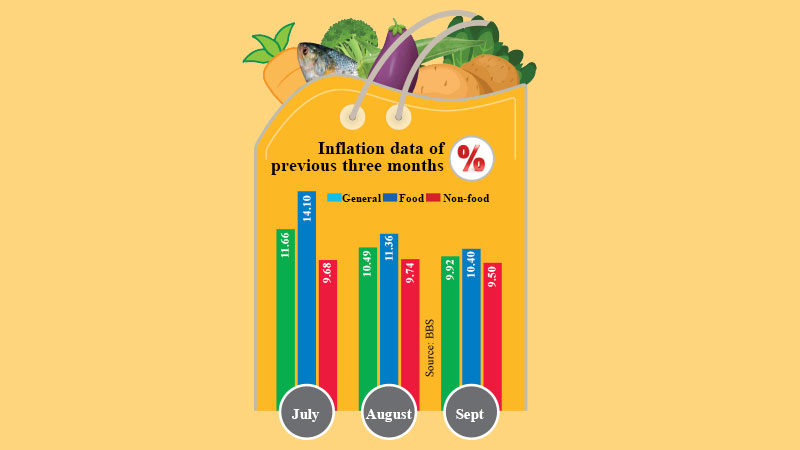According to government data, despite rising prices for
essential commodities, the country’s general inflation decreased in September.
Last month, the general inflation rate fell to 9.92 percent. Although food
inflation dropped by 0.96 percentage points, it remained in double digits.
Non-food inflation also fell by 0.24 percentage points, settling at 9.50
percent.
Yesterday (Wednesday, October 2), the Bangladesh Bureau of
Statistics (BBS) released the updated Consumer Price Index (CPI) data for
September, revealing a reduction in all types of inflation.
Analysts suggest that food inflation continues to decline even
though food prices have not dropped significantly. They believe the weight of
food products in the inflation basket is still low, possibly due to
methodological issues. They call for an independent monitoring committee to
ensure transparency, noting that the BBS remains unchanged and market
syndicates remain active.
BBS data shows that inflation eased slightly in September
compared to July and August. In July, under the previous Awami League
government, inflation had surged to 11.66 percent, with food inflation hitting
a 13-year high of 14.10 percent. However, in August, the first month of the
interim government, general inflation dropped to 10.49 percent, while food
inflation decreased to 11.36 percent.
According to the BBS report, non-food inflation also declined to
9.50 percent in September, down from 9.74 percent in August. However, rural
households are struggling more with essential purchases compared to urban
areas. In September, inflation in rural areas averaged 10.15 percent, while
inflation in urban areas stood at 9.83 percent.
Though inflation rates are trending downward, prices of
essential goods have not decreased significantly in the market. In fact, prices
have risen for some items. According to the Trading Corporation of Bangladesh
(TCB), the price of eggs per dozen increased by 8 percent, from BDT 53 on
August 31 to over BDT 56 by the end of September. Similarly, broiler chicken
prices rose from BDT 155-170 per kilogram in August to BDT 170-185 in
September. Prices of coarse rice, potatoes, oil, and sugar also increased.
Market insiders claim that actual prices may be even higher.
Agricultural economists agree that prices have not dropped;
leaving consumers under increased pressure rather than relieved. Agricultural
economist Dr. Jahangir Alam told Bonik Barta, “The prices of rice, eggs, fish,
meat, vegetables, and potatoes have slightly increased. Recent floods in the
eastern and northern regions have affected production, and aman rice yields may
fall short by about 2.4 million tons. Import issues due to LC complications are
also contributing to supply shortages. In this situation, traders exploit weak
market management, keeping prices high for essential agricultural products.
However, prices might decrease in the near future if the upcoming Rabi season
is effectively utilized.”
Inflation is calculated by assigning a weight to each product or
service and then assessing the rate of price increase for each. According to
the inflation heatmap released by Bangladesh Bank, staple foods such as grains
have a weight of over 21 percent, with rice alone accounting for 20.31 percent
and eggs nearly 5 percent. Fish carries a weight of almost 7 percent, while
spices exceed 4 percent. Despite no price reduction for these items in August,
prices for broiler chickens and eggs have gone up, and rice prices remain
uncontrolled.
BBS data indicates that non-food inflation also declined
slightly last month, falling to 9.5 percent in September from 9.74 percent in
August. However, household gas prices have been hiked recently, and there is no
sign of rent decreases. Additionally, transport and water costs have risen over
the past few weeks.
According to BERC, the price of a 12-kg LPG cylinder was set at
BDT 1,363 in June this year, and by July, it had risen to BDT 1,366. In August,
it climbed to BDT 1,377, reaching BDT 1,421 in September and BDT 1,456 for this
month. Over five consecutive months, the price has increased by BDT 93.
Economists point out that BBS remains unchanged, and the
inflation basket has not been updated, which still underweights essential food
products.
Commenting on the issue, economist and East-West University
Professor Dr. A.K. Enamul Haque told Bonik Barta, “Although market prices
haven’t decreased, inflation is dropping. There may be methodological issues
here, and an independent committee should monitor the process to ensure
transparency. Extortion on the streets and syndicate activities in the market
still persists. The government needs to address these issues.”
BBS’s data is seen as unreliable by over a third of the
population, particularly regarding inflation statistics. Their skepticism
extends to other BBS figures as well, according to a survey conducted by BBS
itself. The ‘Report on User Satisfaction Survey (USS) 2024’ found that 33.16
percent of BBS’s total users do not trust its inflation-related statistics.
Another 27.44 percent believe the data is less reliable, and 5.72 percent
consider it entirely unreliable. Issues with statistics became more pronounced
after A H M Mustafa Kamal took office as the Planning Minister in 2014 under
the previous government.
Statistics expert Zia Hassan recently told Bonik Barta, “There
are major questions surrounding the country’s inflation and growth data. A
commission should be formed to verify this data, or an independent body could
cross-check it. These figures are critical, especially since interest rates are
set based on them, making them crucial for ensuring macroeconomic stability.”
Despite attempts to reach BBS Director General Mohammed Mizanur Rahman for comment, no response was received immediately.

